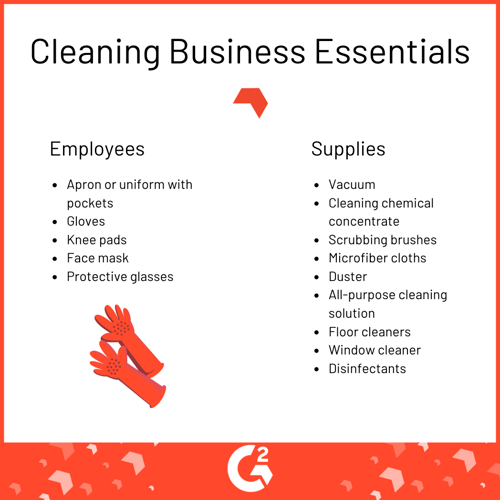The cleaning business is a lucrative one.
With high-demand and low upfront costs, starting a cleaning business is perfect for those who are ready to put in both physical and mental work. As with any new business, there’s a lot of planning involved. These seven steps will guide you on your way to success.
Start a cleaning business in 7 steps
- Create a budget
- Determine a company name and logo
- Register your business
- Purchase cleaning supplies
- Set your rates
- Market your business
- Maintain customers
We’re not just going to leave you with those steps, continue reading for a deep dive into starting and maintaining your very own cleaning business.
How to start a cleaning business
Ready to start your very own small business? Once your cleaning business is up and running, it allows for flexible business hours, a variety of work, and competitive wages. Now it’s time you commit to yourself and get this business going.
Create a budget
Cleaning businesses are known for their minimal start-up costs, but there’s no such thing as a free lunch.
Learning how to make a budget is crucial to a successful business. Here’s a breakdown of the costs to consider when making your own budget:
- Business licenses and permits: $30- $60
- Cleaning equipment and products: $200- $600
- Insurance: $1,000- $4,000/year depending on number of employees
- Advertising: Varies depending on what type of advertisements you place (more on this later)
- Labor: At least $10/hour per employee
|
Note: If you have a larger budget and want to scale quickly, considering investing in cleaning services software.

|
Making a budget is simple, but sticking to a budget is a little tougher. Gather the funds that you have and then determine exactly how much you need to save in order to make your business get off the ground.
Determine a company name and logo
Now, this is the fun part. Come up with a business name that is clear and true to you. Try not to overcomplicate things with a name that doesn’t pertain to cleaning. The name of your cleaning business will give the first impression to potential customers.
Making your business name memorable, yet relevant is the challenge. What may be a funny name to you, may not be funny to another person. Since the cleaning business is slightly more light-hearted than other business ventures, you can be slightly more creative.
Once you come up with a name, check that no one else has the same company name, or even worse, has trademarked the name you want.
| TIP: Don’t know the difference between trademark vs copyright? You’re not alone. Learn the details surrounding intellectual property so that your business name doesn’t break a law. |
After you established your name, it’s time to make a logo so that people can recognize your company when they see it. The logo design process can be complicated, but if you have some inspiration, and several people to review your logo, you’ll be ok.
Register your business
Registering your business seems like a pain, but it will only help your company run smoothly. In order to do this, you must learn how to register a business and why it’s important. When you register your business it establishes your company as a legal entity, which gives you certain tax benefits and limits your personal liability.
Businesses and licensing laws vary between states and even cities, so make sure you research the local laws before you start registering.
Some places may require you to purchase insurance for your business, this is because accidents happen on the job, especially when entering someone else’s company or home to clean.
Purchase cleaning supplies
Of course, you must buy cleaning supplies, but don’t slack in this department. Cleaning is unpredictable and if you’re not prepared with the right supplies or equipment, you may end up disappointing a client.

Set your rates
Before you set your rates, check out what your competition is doing. There are two routes you can take with setting rates.
You can have a flat rate or an hourly rate. Typical hourly rates for cleaning is between $50 and $100 hourly fee depending on the type of cleaning and your location. Most flat rates for a single-family home are between $120 and $170.
Some cleaners charge for square footage, this rate-model is used when cleaning businesses and high-rise buildings.
You can then set prices for add-ons, such as cleaning behind appliances, dusting hard to reach vents, carpet cleaning, laundry, etc.
The most common billing method is hourly, which is best for cleaning businesses because you never know what you’re getting into until you’ve arrived at your client’s location.
Market your business
Getting your first customer is the most difficult part of starting a business. If you don’t have a budget for advertising, there are still some ways you can market your business.
Making an Instagram business profile is a good way to get your business out there and show the work you can do. Take before and after pictures of your cleaning to prove your value to potential customers.
You can also use word of mouth marketing to get your business started. Cleaning businesses succeed based on word of mouth marketing. People love hiring someone that their family or friend trusts, so be sure to encourage your clients and friends to tell others about your cleaning business. In a world of misinformation, word of mouth marketing is viewed as one of the most authentic forms of marketing.
Maintain clients
Give your clients an incentive to use your cleaning service again by creating a loyalty program. There are many loyalty program types, such as point-based, value-based, and tiered-based.
Another way to maintain clients is by simply doing a good job. If they feel they’re getting exceptional service for the rate you’re charging, then they’re likely to use your cleaning service again. Go the extra mile and add something special to your cleaning service, whether it’s making swans out of the tissues, or organizing a child’s stuffed animals, it’s things as such that will keep your clients coming back.
How much does a cleaning business make in a year?
The sky’s the limit with cleaning businesses. If you cleaning back-to-back homes seven days a week, you’ll make more than cleaning three days a week.
If you’re charging $50 per hour of work and work 2,000 hours a year (50 workweeks) you’ll make a gross pay of $100,000 annually. This is not including the above-mentioned overhead costs. With a cleaning crew, you can make even more because you can clean much faster.
Start off with a clean slate
Making a successful cleaning business is entirely dependent on the level of effort you put into it. If you think you have what it takes to start a cleaning business, get started by following outlined steps.
Read these small business tips next so that you can apply them to your cleaning business strategy.
 by Lauren Pope
by Lauren Pope
 by Mary Clare Novak
by Mary Clare Novak
 by Scott Turner
by Scott Turner